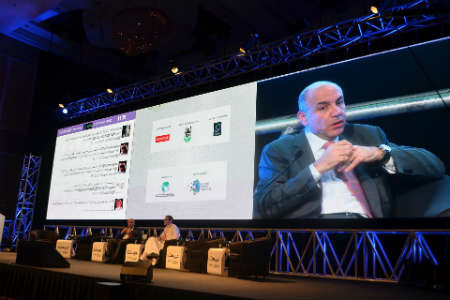The world has added more than a billion mobile subscribers in the last 4 years alone, with the total number reaching 3.2 billion, almost half the Earth’s population. More than a billion of these devices are smartphones, bringing the disruptive power of internet connectivity to both professional and social spheres: whether through the 10.5 million jobs supported directly by the mobile ecosystem, or through proliferation of apps that change the way we perceive and interact with the world.
The Saudi mobile phone market is the largest in the Middle East and boasts one of the highest mobile penetrations in the world, with 53 million subscriptions by 2013, and a mobile penetration rate of 181.6 percent – almost 2 mobiles per user. Leaders in mobile business and decision makers across sectors will convene to discuss the latest trends and opportunities in mobility at the 3rd edition of ArabNet Riyadh, the largest digital gathering in Saudi Arabia, taking place on November 11-13.
The banking sector is one of the many traditional sectors currently being disrupted by today’s fast-paced innovation. Leading banks in the MENA region have created numerous initiatives to keep up with, ranging from mobile apps and m-payments to smart branches and ATMs. “In banking, digital transformation is not only important; it is imperative. Globally, traditional businesses are facing disruption through the proliferation of a digital society, and banking is no different,” says David Horton, CTO at Dubai-based Mashreq Bank. Last April, the Saudi Investment Bank “SAIB”, a leader in the banking sector in GCC, announced the availability of the first Google Glass banking app in the region. Other innovative initiatives include the Smart ATMs launched by Emirates NBD, and the smart branches launch by Bank Audi (Novo) and Bank of Beirut (B-Smart), which include photo/signature recognition, and videoconferencing capabilities with the customer service call center.
The global marketplaces provided by mobile technology can challenge existing market leaders, and one service that is being affected in particular is taxi cabs. Saudi Arabia has become a highly competitive market for apps that provide private drivers, like UAE-based Careem and California-based Uber, which are both growing rapidly in the Kingdom. Careem received funding from STC ventures to speed their growth in the Saudi Arabian market. Similarly, taxi agencies are being challenged by the advent of new apps like Easy Taxi, which allows users to book and rate cabs directly, and which has recently received funding from Mobily ventures.
The impact of digital and mobile technology on business will be a key topic of discussion at the 3rd edition of ArabNet Riyadh, which will gather more than 800 digital professionals and 80 regional and international speakers for 3 days of high-level panels and talks. For the first time this year, ArabNet Riyadh will include a Design+Code Day – a full day of workshops and networking activities to help build skills in design, coding, and product development. ArabNet will also feature its signature entrepreneur competitions, the Ideathon, the Startup Demo, and the Battle of the Games, which will highlight the most promising and innovative young businesses from Saudi Arabia and beyond.
For more details, you can visit ArabNet Riyadh’s page: https://arabnet.me/conference/Riyadh/

